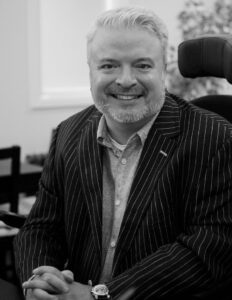The journey of living with a rare neuromuscular disorder, such as muscular dystrophy, is a deeply personal, often isolating experience. From insights drawn over the past 22 years from the Muscle Help Foundation (MHF) charity, it is a journey that requires resilience, adaptation, and relentless advocacy. In spotlighting bereavement, MHF worked closely in partnership with the University of Hertfordshire, deepening its knowledge and learning about loss.
By Founder & CEO Muscle Help Foundation, Michael McGrath MBE

For families, especially parents, the muscle wasting condition shapes every facet of daily life: from navigating complex care systems to managing clinical uncertainties, from celebrating small victories to carrying the constant weight of anticipatory grief.
When a young life is ultimately lost to muscular dystrophy, the impact is seismic. The loss reverberates not only through the family unit, but also through the wider community of healthcare providers, support workers and those who walked alongside them.
Bereavement, in this context, carries unique emotional and psychological challenges. Unlike sudden or unexpected loss, the death of a child with a progressive neuromuscular condition comes after years, sometimes decades, of selfless care, unconditional love and incremental loss.
Understanding grief
From MHF’s direct experience, made up of conversations from parents who have lost their predominantly Muscle Warrior sons, mums and dads do not grieve in isolation from this journey; they grieve with it. That’s why sensitivity around bereavement in this specific community is not just important, it is, as MHF believes, essential. Understanding the contours of this grief is key to helping often vulnerable families make sense of their loss in a way that honours their child’s life, their memories and legacy, and importantly, allows them to carry that remembrance forward without being overwhelmed by it.
The MHF charity, which delivers highly personalised Muscle Dream experiences for vulnerable children, young people and young adults (8-28yrs) living in the UK with muscular dystrophy and allied neuromuscular conditions, has long recognised this complexity. The charity’s model is rooted not only in delivering joyful, confidence-building, memory-making moments but in fostering long term relationships with families. These bonds become especially meaningful in the event of a child’s passing, because when that moment comes, the memory of the Muscle Dream becomes more than just a moment in time. It becomes a cherished story, a symbol of identity and positivity, and a source of light amid the darkness of loss.
This continuity of care, beyond the Muscle Dream intervention, beyond the moment when it was realised, is where the charity’s impact is often most deeply felt. Families continue to be active participants within what the charity calls its ‘Muscle Warrior tribe’ – a growing community bound by shared experience, mutual support, social connection and an understanding that does not need to be explained. From internal feedback and research conducted by the charity, it is clear that this community plays a ‘significant part’ in how bereaved families process and hold on to the memory of their loved ones. Through events, legacy touchpoints, and ongoing contact, families remain connected, not just to the MHF organisation, but to each other.
Holistic
For medical professionals, researchers, and allied health teams working in neuromuscular care, this model of holistic, longitudinal support is worth noting. It offers a framework for how third-sector organisations can work alongside clinical services to address the broader psychosocial needs of families, particularly in the aftermath of bereavement. It also reinforces the value of relationship-based care in rare disease communities, where for example trust, familiarity, and continuity are not just beneficial, but in MHF’s eyes, essential.
To the families who are still on this journey, who are caring for sons or daughters living with muscular dystrophy or allied neuromuscular conditions, the Muscle Warrior tribe represents a space of shared language and lived understanding. And for those who have experienced loss, it is a space where their child’s name is still spoken, their life still honoured, and their legacy carried forward in ways that offer comfort, dignity, and real meaning.
In a landscape where clinical outcomes often dominate the narrative, the Muscle Help Foundation charity reminds us that memory, connection, and community are just as vital to the long term wellbeing of families. In remembering the children who have passed, and in walking with the families who loved them, the charity does something rare: it bridges the gap between grief and hope, between the end of one journey and the quiet beginnings of another.

More:
Muscle Help Foundation
Reg Charity No. 1096716



